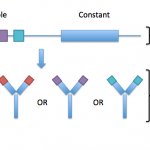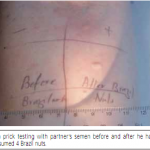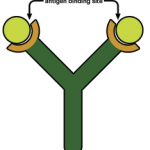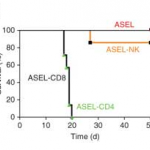
Ever wondered what the bottom of the ocean looks like? Well, now's your chance to check out streaming live HD footage from the ROV ROPOS which is currently working out at Axial Volcano on the Juan de Fuca Ridge. Currently they are checking out a brand new lava flow, but later this evening and tomorrow they will be working at Ashes hydrothermal vent field (one of my study sites). While not all of the work is microbe-related (there is a lot of geology going on), the fact that they are streaming live and sharing audio conversations with other scientists on land was too cool to share. Also,…
I'm on vacation this week, but was working on a post about the evolution of antibodies to be posted yesterday. Unfortunately, what greeted me when I turned on my computer thursday was this:
(source)
I'm actually a little surprised at how well I'm handling it, I would have expected that I'd be a wreck. Maybe it's my current idyllic location, or watching season 5 of Six Feet Under to give me perspective, or maybe it's the fact that I just decided to to a time-machine back up for the first time just before I left (which means, barring a meltdown on my external hard drive, the worst case is that…
Dear Readers,
I have been more absent than usual from this blog, which is something I regret. However, the time constraints of preparing for my upcoming qualifying exam necessitate this. I decided to break my strict "no distractions" policy to bring you this bit of info that was emailed to me by a lab mate.
Scientists have discovered DNA components in a meteorite, and they seem to be fairly certain it was made there! You can read the actual NASA press release here, and check out a cool video of one of the scientists explaining the discovery here. The cliff notes version is that, while…
I took my first immunology class at UCSD in the spring of 2004. I've always been interested in signaling (how cells take information from the outside and translate that to the inside) but the subject matter of this class was set to disappoint - in terms of signaling, it more or less stopped at the outer membrane of cells. Even though looking back, I can see now that a subject as vast as immunology has to cut some corners in a 10 week course, early on that quarter I was a bit frustrated. But just before the first midterm, we started learning about one of the most bizarre behaviors of cells…
I've refrained from commenting on #elevatorgate snafu, mostly because I feel like I can't add anything original and neither side is making any sense any more. Or at least, the extremests on both sides are drowning out the people who are making sense. For my part, it seems to me like everyone did some things wrong. Elevator dude acted a bit creepy, he probably shouldn't have done that. Watson called out a student who dared contradict her and lumped that student in with misogynists when she couldn't defend herself, Watson probably shouldn't have done that. I'm not sure why people couldn't just…
While researching Wednesday's post, I ran into a number of strange case studies. They didn't quite fit into that post, but I thought they were too interesting to ignore. If you're interested, follow me down the pubmed rabbit hole.
When I typed "semen allergy" into google scholar last week, the very first hit was this paper [pdf]:
We report the case of a 20-year-old woman with documented Brazil nut allergy who developed widespread [hives] and mild [shortness of breath] after intercourse with her boyfriend who had earlier consumed Brazil nuts. Skin prick testing with the boyfriend's semen…
There's this NPR show I really like called "On the Media," and I've listened to just about every episode for the past 8 years through the podcast. As it's name implies, the show is about the media, and is a wonderfully meta way of getting the news through the prism of analyzing the way the news is covered.
Throughout most of the last decade, I formed a mental image of the hosts, Brooke Gladstone and Bob Garfield, and those mental images include faces, though I'd only ever heard their voices. My mental image of Brooke was of an early-sixties, petite lady with greying hair, maybe something like…
For about two years in high school, I would occasionally break out into pretty severe hives. I would first notice a mild itch on my wrists or ankles, and I would know that the hives were coming if I gently scratched my forearm and raised red streaks were left behind (I have a picture somewhere of a large inflamed smiley face I drew on my chest during one of these episodes). A dose or two fo Benedryl would completely knock the hives down, but left untreated, they would spread over my entire body. It was almost certainly an allergic reaction, but despite a battery of tests at an allergist's…
Antibodies are often thought of as magic bullets, and as far as bullets go, they are about as magic as you can get. Antibodies are proteins that are manufactured by specialized "B-cells," and their main feature is that they stick to things. At first glance, biochemical stickiness does not seem all that magical; there are innumerable examples of proteins that have evolved to interact with one another or with other types of molecules. But while natural selection can take millions of years to refine an interaction, your body can mount an immune response and generate antibodies against almost any…
In some ways, I'm kinda jealous of the research Heather does. I love my macrophages, but studying the bugs that live in the extreme environment of deep sea hydrothermal vents has always fascinated me.
As a consequence of the stuff she studies, Heather also has to (gets to?) take multi-week sea voyages to travel out to these creatures' hang out in order to gather samples.
This year we will once again be on the Juan de Fuca Ridge, but we will be further South at Ashes vent field in Axial caldera. I'll see if I can find a map for the next post. We will be deploying an exciting instrument to do…
The field of immunology has a few quirks. I'm sure this is no different than other fields of study, but one of the most puzzling (and sometimes infuriating) of these quirks is an obsession with categorizing different types of cells. Case in point, a recent paper in Nature Immunology:
A semi-invariant Vα10+ T cell antigen receptor defines a population of natural killer T cells with distinct glycolipid antigen-recognition properties
But before I get into that, allow me to provide some back-story.
Identifying Cells
First, I should be clear, immunology isn't alone in trying to delineate…
There's a great post at the Sciam guest blog describing the science of antimicrobial cleaners, and it doesn't look promising:
perhaps the most comprehensive study of the effectiveness of antibiotic and non-antibiotic soaps in the U.S., led by Elaine Larson at Columbia University (with Aiello as a coauthor), found that while for healthy hand washers there was no difference between the effects of the two, for chronically sick patients (those with asthma and diabetes, for example) antibiotic soaps were actually associated with increases in the frequencies of fevers, runny noses and coughs. In…
Been working hard on lab science, so I haven't had as much time for blog science, but I thought I'd share something else I'm proud of:
My friend Matt and I hiked to the top of Mount Jefferson in northern New Hampshire this past weekend with a table, 2 chairs, a bottle of wine, glasses, camera and tripod strapped to our backs. It was quite strenuous, and we didn't actually end up using the chairs (which were an extra 15lbs or so that I trudged up 4000 vertical feet with), but it was totally worth it.
The GPS track and more pictures after the jump.
02-JUL-11 02
EveryTrail - Find the best hikes…
Abbie over at ERV has a really great summary of a new Nature Medicine paper, in which the authors managed to turn a mouse's immune system against prostate tumors by infecting them with viruses engineered to express prostate proteins. Some of the results struck her as a bit counterintuitive, but I thought of some possible explanations. I was going to leave this as a comment on her blog, but the more I read the paper, the more stuff bubbled up, and I though it deserved a full post. Go read Abbie's post first though, or this probably won't make much sense.
Admittedly speculative explanations to…
Over at Pharyngula, PZ mentions a media criticism paper in the journal Public Understanding of Science. The paper shows that media outlets frequently make scientific claims that are dubious at best. I suppose this isn't very surprising, but PZ makes another great point:
It isn't open access, though, so apparently the Public is not allowed to read about the Public Understanding of Science unless they cough up $25 per article. They can read about "science" for cheap in their local tabloid, though. Isn't this part of the problem, too? Let's also put part of the blame on a science publishing…
Anthony Weiner is an idiot. I think we can at least all agree that if you're going to use a social networking site to spread illicit photos of yourself, you damn well better learn the difference between direct messaging and displaying your crotch to all of your followers. That said, all of us are idiots sometimes. And if I had to put money on it, I'd wager dollars to donuts that the thing we are the most stupid about is sex. But why?
What's the point of sex? You may think I'm the idiot for asking the question - the answer is obvious, right? Well...
The answer to why humans have sex turns out…
In my first year of graduate school, Professor Sam Behar was giving us a lecture about phagocytes, a group of cells that includes macrophages, neutrophils, and a number of other immune cells that tend to gobble things up. These cells are all over the place, and some can stay in the same place for many years. "How long?" he asked, and then clicked to a slide that had a picture of my back.
To be fair, he didn't know it was my back - but all of my classmates did, and it was kind of awkward. The point he was trying to make is that phagocytes take up tattoo ink, but aren't able to break it down…
Attention: Boston-based Beasties
Tomorrow is the second Tuesday of June, and you know what that means: an all new Science by the Pint. From the organizers:
As always, Science by the Pint is at 7:00pm on the second Tuesday of the month (June 14th) at Tavern in the Square in Porter Square. Tavern in the Square will provide a $10 gift card for every 10 people in attendance to raffle off as a door prize. Science by the Pint is primarily a mingling event, but there should be ample table space available. If you plan to eat dinner, make sure to arrive early to get a seat and to get your orders in!…
Someone is wrong on the internet:
I love that nomenclature, "the God particle". It is a sign that scientists sometimes are unabashed about acknowledging what atheists are often reluctant to grasp: that "believing" in science involves faith too.
Faith in science is far more practical than faith in the idea that a big, omnipotent boy did it and ran off. Or I place my faith in that argument anyway. But it's still faith, not fact, so sneering at faith per se is not a very reasoned or logical mode of argument.
Leaving aside the fact that most physicists do not believe in god, and the name is more…
In the wild, as I wrote about last week, some strains of commensal bacteria in mosquitoes seem to confer some resistance to infection with Plasmodium, the parasite that causes malaria in humans. Not content to wait for for nature to get around to it, researchers at Johns Hopkins University decided to see if they could nudge the process along:
Wolbachia Infections Are Virulent and Inhibit the Human Malaria Parasite Plasmodium Falciparum in Anopheles Gambiae
Wolbachia is a type of bacterium that often infects insects, including mosquitoes, and causes incredibly strong immune responses, but no…








